- Tags:
- Akasaka / bean paste / flagship store / Gallery / Hiroshi Naito / Japanese confection / nama-gashi / shop / Store / tea room / Toraya / traditional Japanese confection / Wagashi / yokan
Related Article
-
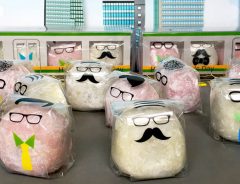
Traditional Japanese Sweets Packaged As Hardworking Dads On Jam-packed Train For Father’s Day
-
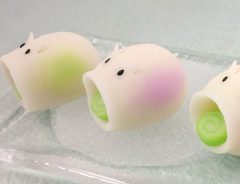
Japanese Symbol of Summer, Pig with Mosquito Coil in its Mouth, Made as Traditional Sweets
-
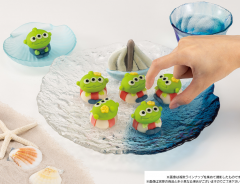
Toy Story Aliens Reappear as Traditional Japanese Sweets in Convenience Stores For Summer
-
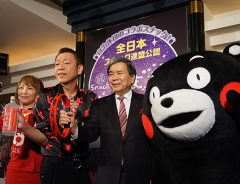
Japan’s Most Beloved Bear Makes This Tokyo Bar Easy To Enter, Hard To Leave
-
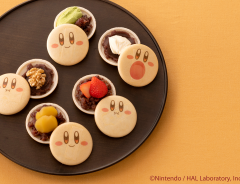
Make Your Own Wagashi Kirby With Traditional Japanese Sweets DIY Kit
-
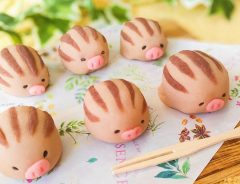
Food artist turns Pokémon into awesome traditional Japanese sweets
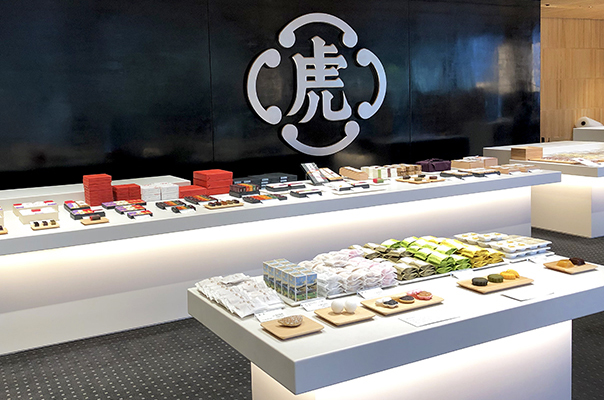


Toraya: From Kyoto to Tokyo
For half a millennium, Toraya has been making the traditional Japanese confections known as wagashi. Founded in Kyoto in the early 16th century when it was purveyor to the imperial court, Toraya moved its headquarters in 1869, following the transfer of the capital from Kyoto to Tokyo.
After trying a few locations within the city, Toraya eventually settled on the wealthy neighborhood of Akasaka for its headquarters in 1964. However, after over 50 years, the building began showing signs of age, and Toraya decided to completely refashion its flagship store from the ground up, creating not only a building which testifies to the success and venerable tradition of the Toraya brand but also embodies its values with its use of traditional and modern architecture.
A Refurbished Flagship Store
In October, 2018, Toraya opened its elegantly refurbished flagship store to the public.
Exterior
With its glass and wood exterior crowned with a roof in black lacquer made in the ancient plaster technique of shikkui and emblazoned with Toraya’s tora 虎 (tiger) logo, the building strikes an elegant form.
photo by © grape Japan
The Toraya logo and iron latticework from the original building is displayed at street level when you approach the entrance.
photo by © grape Japan
The main entrance, with the famous Toraya sign in the hiragana syllabary, written horizontally from right to left in the ancient style, on white noren curtain panels.
photo by © grape Japan
Once you step inside, the warm tones of hinoki cypress wood, used abundantly in the walls and panels, create a warm and inviting mood. Hiroshi Naito's architecture shines with a combination of traditional and modern accents.
Lobby: Reception
The reception is where you can ask information, make a reservation for the Toraya Tea Room on the 3rd floor, receive pamphlets and even purchase certain Akasaka shop limited edition items such as thin bars of yokan bean paste jelly in a packages decorated with Hiroshi Naito's architectural sketches for the shop.
photo by © grape Japan
An ikebana display gracefully livens up the white reception desk counter
photo by © grape Japan
photo by © grape Japan
Inconspicuously located in a slim wall panel near the elevator, there's a convenient vending machine selling pouches of "Yokan à la carte" containing 6 bite-sized pieces of strawberry, matcha and even miso flavored yokan.
photo by © grape Japan
Basement: Gallery
photo by © grape Japan
The gallery features regularly changing exhibits highlighting aspects of Toraya's history and wagashi manufacture. During our visit in December, there was an exhibit on the different types of yokan Toraya historically made and reproductions of the master patterns used to create them.
photo by © grape Japan
The mortar and wooden spoon-like pestle used to make yokan
photo by © grape Japan
A map of yokan types and their regional distribution among the numerous Toraya shop locations within Japan.
photo by © grape Japan
Just like most of the information within the Toraya flagship store, English translations are printed or separately available upon request. Here is an exhibit guide which was available at the gallery reception.
photo by © grape Japan
Second Floor: Shop
photo by © grape Japan
After climbing up the central staircase, you'll arrive at the second floor main shop area where countless varieties of Toraya confections are neatly displayed on tables arranged in rows against a striking black lacquer wall boldly highlighted by a giant Toraya logo.
photo by © grape Japan
Seasonal varieties, such as yokan decorated in a wild boar pattern to symbolize the new year, are prominently featured.
photo by © grape Japan
Only available at the Akasaka flagship shop, Senri no Kaze 千里の風 (Wind of a Thousand Miles), is a yokan decorated in a pattern meant to symbolize a fast and powerful tiger running like the wind.
photo by © grape Japan
In one corner of the floor, you'll find artifacts from Toraya's history such as these beautiful tiered boxes from the 18th century decorated with tigers and the Toraya logo
photo by © grape Japan
Toraya's confections are not limited to yokan, also featuring colorfully patterned an-yaki cakes such as these...
photo by © grape Japan
...and the pinnacle of wagashi artisansry, the nama-gashi (literally "raw confection") which delight with their colorful and delicate seasonal designs.
photo by © grape Japan
Third Floor: Tea Room
Another special treat available at the flagship store is a chance to enjoy some of Toraya's confections or a light meal, traditional deserts, hot and iced tea drinks and other beverages in the comfort of an elegant tea room with premium views overlooking Akasaka.
Climb the staircase to the third floor (or take the elevator), take a number (if you haven't already at the lobby) and have a seat, or observe Toraya confections being made in front of your eyes through a glass window looking into the central kitchen
photo by © grape Japan
The entrance of the Tea Room
photo by © grape Japan
This is only a sample of some pages of the menu which changes with the seasons.
The seasonal meal features savory as well as sweet items.
photo by © grape Japan
The list of seasonal nama-gashi sweets available when we visited.
photo by © grape Japan
The Senri no Kaze yokan and Zangetsu (waning moon) cake with bean paste filling, available in a set with either sencha green tea, or with matcha or matcha glacé (iced matcha).
photo by © grape Japan
Since it was only available in the Akasaka flagship store, we ordered the Senri no Kaze with a matcha glacé set.
photo by © grape Japan
photo by © grape Japan
Sweet, flavorful, and a perfect match for the iced matcha.
photo by © grape Japan
The tea room also overlooks the Toyokawa Inari Betsuin temple, which you may want to visit after your enjoyable time at Toraya's flagship store.
photo by © grape Japan
Shop Information